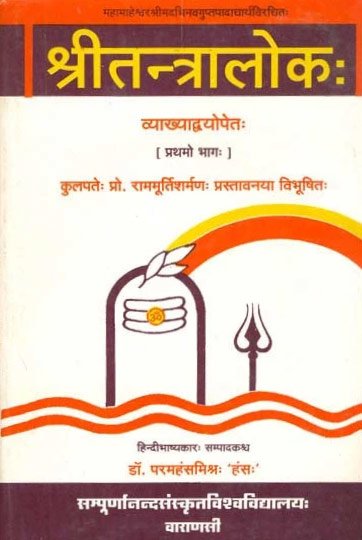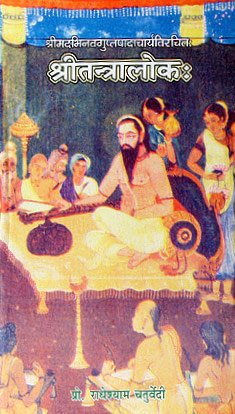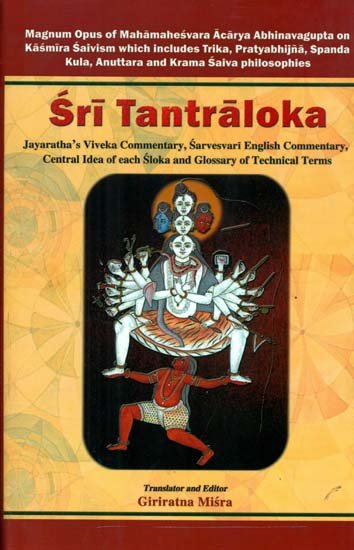Tantraloka [sanskrit text]
by Jun Takashima | 2020 | 46,255 words
The Sanskrit text of the Tantraloka of Abhinavagupta including grammatical analysis, English glossary and comparative print editions. The Tantraloka (“light on Tantra”) was written by Abhinavagupta in the 10th century in Kashmir and represents a major Encyclopedic work in Shaivism dealing with many core aspects and terminology.
Verse 21.25
चित्तमाकृष्य तत्रस्थं कुर्यात्तद्विधिरुच्यते ।
मूलाधारादुदेत्य प्रसृतसुविततानन्तनाड्यध्वदण्डं वीर्येणाक्रम्य नासागगनपरिगतं विक्षिपन् व्याप्तुमीष्टे ।
यावद्धूमाभिरामप्रचिततरशिखाजालकेनाध्वचक्रं संछाद्याभीष्टजीवानयनमिति महाजालनामा प्रयोगः ॥ २५ ॥
cittamākṛṣya tatrasthaṃ kuryāttadvidhirucyate |
mūlādhārādudetya prasṛtasuvitatānantanāḍyadhvadaṇḍaṃ vīryeṇākramya nāsāgaganaparigataṃ vikṣipan vyāptumīṣṭe |
yāvaddhūmābhirāmapracitataraśikhājālakenādhvacakraṃ saṃchādyābhīṣṭajīvānayanamiti mahājālanāmā prayogaḥ || 25 ||
The English translation of Tantraloka Verse 21.25 is contained in the book Sri Tantraloka by Satya Prakash Singh & Swami Maheshvarananda. This book is not available online so in order to read the full text and translation you should buy the book:
Buy now! English translation by Satya Prakash Singh & Swami Maheshvarananda (2015)
Glossary of Sanskrit terms
Note: This extracts Sanskrit terms and links to English definitions from the glossary, based on an experimental segmentation of verse (21.25). Some terms could be superfluous while some might not be mentioned. Click on the word to show English definitions.
Citta, Akrishya, Tatrastha, Tad, Tat, Vidhi, Ucyat, Muladhara, Prasrita, Suvitata, Anta, Nadi, Adhva, Danda, Virya, Akramya, Nasa, Nas, Gagana, Parigata, Kshipat, Vya, Yavat, Hum, Iyam, Idam, Ama, Pracita, Tara, Shikha, Jalaka, Cakra, Sanchadya, Abhishta, Jiva, Ayana, Iti, Mahaja, Prayoga,
Analysis of Sanskrit grammar
Note: this is an experimental feature and only shows the first possible analysis of the Sanskrit text (Tantraloka Verse 21.25). If the system was successful in segmenting the sentence, you will see of which words it is made up of, generally consisting of Nouns, Pronouns, Verbs, Participles and Indeclinables. Click on the link to show all possible derivations of the word.
- Line 1: “cittamākṛṣya tatrasthaṃ kuryāttadvidhirucyate ”
- cittam -
-
citta (noun, masculine)[adverb], [accusative single]citta (noun, neuter)[adverb], [nominative single], [accusative single]cittā (noun, feminine)[adverb]√cit (verb class 2)[imperative active second dual]
- ākṛṣya -
-
ākṛṣya (noun, masculine)[compound], [vocative single]ākṛṣya (noun, neuter)[compound], [vocative single]
- tatrastham -
-
tatrastha (noun, masculine)[adverb], [accusative single]tatrastha (noun, neuter)[adverb], [nominative single], [accusative single]tatrasthā (noun, feminine)[adverb]
- kuryāt -
-
√kṛ (verb class 8)[optative active third single]
- tad -
-
tad (indeclinable)[indeclinable]tad (indeclinable adverb)[indeclinable adverb]tat (indeclinable correlative)[indeclinable correlative]tad (noun, neuter)[compound], [nominative single], [accusative single]
- vidhir -
-
vidhi (noun, feminine)[nominative single]vidhi (noun, masculine)[nominative single]
- ucyate -
-
√uc -> ucyat (participle, masculine)[dative single from √uc class 4 verb]√uc -> ucyat (participle, neuter)[dative single from √uc class 4 verb]√vac (verb class 2)[present passive third single]√vac (verb class 3)[present passive third single]
- Line 2: “mūlādhārādudetya prasṛtasuvitatānantanāḍyadhvadaṇḍaṃ vīryeṇākramya nāsāgaganaparigataṃ vikṣipan vyāptumīṣṭe ”
- mūlādhārād -
-
mūlādhāra (noun, neuter)[adverb], [ablative single]
- udet -
-
√ud (verb class 6)[optative active third single]
- ya -
-
- prasṛta -
-
prasṛta (noun, masculine)[compound], [vocative single]prasṛta (noun, neuter)[compound], [vocative single]
- suvitatān -
-
suvitata (noun, masculine)[accusative plural]
- anta -
-
anta (noun, masculine)[compound], [vocative single]anta (noun, neuter)[compound], [vocative single]√ant (verb class 1)[imperative active second single]
- nāḍya -
-
nāḍi (noun, feminine)[compound], [adverb], [nominative dual], [vocative dual], [accusative dual]nāḍi (noun, masculine)[compound], [adverb], [nominative dual], [vocative dual], [accusative dual]nāḍī (noun, feminine)[compound], [adverb], [nominative single], [vocative single]
- adhva -
-
adhva (noun, masculine)[compound], [vocative single]adhvan (noun, masculine)[compound]
- daṇḍam -
-
daṇḍa (noun, masculine)[adverb], [accusative single]daṇḍā (noun, feminine)[adverb]
- vīryeṇā -
-
vīrya (noun, neuter)[instrumental single]√vīr -> vīrya (participle, masculine)[instrumental single from √vīr class 10 verb]√vīr -> vīrya (participle, neuter)[instrumental single from √vīr class 10 verb]
- ākramya -
-
ākramya (noun, masculine)[compound], [vocative single]ākramya (noun, neuter)[compound], [vocative single]
- nāsā -
-
nāsā (noun, feminine)[nominative single]nas (noun, feminine)[nominative dual]
- gagana -
-
gagana (noun, neuter)[compound], [vocative single]
- parigatam -
-
parigata (noun, masculine)[adverb], [accusative single]parigata (noun, neuter)[adverb], [nominative single], [accusative single]parigatā (noun, feminine)[adverb]
- vi -
-
vi (indeclinable adverb)[indeclinable adverb]vi (indeclinable preposition)[indeclinable preposition]vi (noun, masculine)[compound], [adverb]vi (noun, neuter)[compound], [adverb], [nominative single], [vocative single], [accusative single]ve (noun, masculine)[adverb]vī (noun, feminine)[adverb]vī (noun, masculine)[adverb]vī (noun, neuter)[compound], [adverb], [nominative single], [vocative single], [accusative single]
- kṣipan -
-
√kṣip -> kṣipat (participle, masculine)[nominative single from √kṣip class 6 verb], [vocative single from √kṣip class 6 verb]
- vyā -
-
vi (indeclinable adverb)[indeclinable adverb]vi (indeclinable preposition)[indeclinable preposition]vi (noun, masculine)[compound], [adverb], [nominative dual], [vocative dual], [accusative dual]vi (noun, neuter)[compound], [adverb], [nominative single], [vocative single], [accusative single]ve (noun, masculine)[adverb]vya (noun, masculine)[compound], [vocative single]vī (noun, feminine)[compound], [adverb]vī (noun, masculine)[compound], [adverb]vī (noun, neuter)[compound], [adverb], [nominative single], [vocative single], [accusative single]
- āptum -
-
√āp -> āptum (infinitive)[infinitive from √āp]
- īṣṭe -
-
√īś (verb class 2)[present middle third single]
- Line 3: “yāvaddhūmābhirāmapracitataraśikhājālakenādhvacakraṃ saṃchādyābhīṣṭajīvānayanamiti mahājālanāmā prayogaḥ ”
- yāvaddh -
-
yāvat (indeclinable)[indeclinable]yāvat (indeclinable relative)[indeclinable relative]yāvat (noun, masculine)[compound]yāvat (noun, neuter)[nominative single], [vocative single], [accusative single]
- hūm -
-
hūm (indeclinable)[indeclinable]
- ābhir -
-
ā (noun, feminine)[instrumental plural]iyam (noun, feminine)[instrumental plural]idam (pronoun, feminine)[instrumental plural]
- āma -
-
āma (noun, masculine)[compound], [vocative single]āma (noun, neuter)[compound], [vocative single]
- pracita -
-
pracita (noun, masculine)[compound], [vocative single]pracita (noun, neuter)[compound], [vocative single]
- tara -
-
tara (indeclinable)[indeclinable]tara (noun, masculine)[compound], [vocative single]tara (noun, neuter)[compound], [vocative single]√tṝ (verb class 1)[imperative active second single]
- śikhā -
-
śikhā (noun, feminine)[nominative single]
- jālakenā -
-
jālaka (noun, masculine)[instrumental single]jālaka (noun, neuter)[instrumental single]
- adhva -
-
adhva (noun, masculine)[compound], [vocative single]adhvan (noun, masculine)[compound]
- cakram -
-
cakra (noun, masculine)[adverb], [accusative single]cakra (noun, neuter)[adverb], [nominative single], [accusative single]cakrā (noun, feminine)[adverb]
- sañchādyā -
-
sañchādya (noun, masculine)[compound], [vocative single]sañchādya (noun, neuter)[compound], [vocative single]
- abhīṣṭa -
-
abhīṣṭa (noun, masculine)[compound], [vocative single]abhīṣṭa (noun, neuter)[compound], [vocative single]
- jīvān -
-
jīva (noun, masculine)[accusative plural]
- ayanam -
-
ayana (noun, masculine)[adverb], [accusative single]ayana (noun, neuter)[adverb], [nominative single], [accusative single]ayanā (noun, feminine)[adverb]
- iti -
-
iti (indeclinable particle)[indeclinable particle]iti (noun, feminine)[compound], [adverb]
- mahājā -
-
mahāja (noun, masculine)[compound], [vocative single]mahāja (noun, neuter)[compound], [vocative single]mahājā (noun, feminine)[nominative single]
- ālan -
-
√al (verb class 1)[imperfect active third plural]
- āmā -
-
āmā (noun, feminine)[nominative single]
- prayogaḥ -
-
prayoga (noun, masculine)[nominative single]
Other editions:
Also see the following editions of the Sanskrit text or (alternative) English translations of the Tantraloka Verse 21.25
Sri Tantraloka (Set of 8 Volumes)
by Paramahansa Mishra (2000)
[श्री तन्त्रालोकः (संस्कृत एवं हिंदी अनुवाद)] Sanskrit Text with Hindi Translation; Published by Sampurnanand Sanskrit University; With two commentaries: Viveka (विवेक) by Ācārya Śrī Jayaratha and Nīrakṣīraviveka (नीरक्षीरविवेक) by Paramhans Mishra.
Buy now!
Tantraloka of Abhinavagupta (with Jnanavati Hindi commentary)
by Radheshyam Chaturvedi (2002)
[आचार्य अभिनवगुप्त द्वारा रचित तंत्रलोक: संस्कृत एवम् हिन्दी अनुवाद (पाँच खंडों में)] Sanskrit Text with Hindi Translation and Commentary; Published by Chaukhambha Vidya Bhawan.
Buy now!
Sri Tantraloka of Abhinavagupta
by Giriratna Misra (2018)
With Viveka Saṃskṛta Commentary by Rājānaka Jayaratha; Sanskrit Text, Transliteration, Sarveshwari English commentary; With Glossary and Central Idea of Each Śloka; Published by Chaukhamba Surbharati Prakashan
Buy now!![Tantraloka [sanskrit text] - book cover](/uploads/a/Tantraloka-Sanskrit.jpg)


